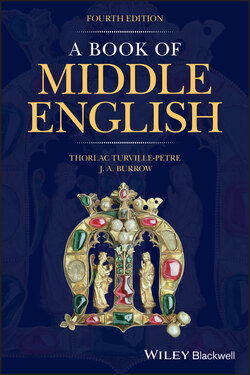Читать книгу A Book of Middle English - J. A. Burrow - Страница 67
5.5.2 Comparatives and Superlatives
ОглавлениеComparative and superlative adjectives and adverbs are formed by adding the endings ‐er and ‐est; see 4.4.3–4. The use of more and most is not so common and, in contrast to modern usage, is found chiefly with short adjectives: most kyd, 9/51. Even with an adverb such as wiseli, the comparative is wiselier, 15/38. Double comparison, with both more and the suffix ‐er, is seen in more wighter, ‘stronger’, 15/201.
Superlatives may be intensified in various ways: by adding the prefix alder‐ (from OE alra, ‘of all’): alder‐grattyst, ‘greatest of all’, 11/5; by a following phrase such as of all oþer; or by the expression one þe before the superlative: on þe most, ‘the very biggest’, 9/137; one þe unhapnest hathel, ‘quite the most unfortunate man’, 11/198. This last construction may easily be wrongly identified with the modern ‘one of the most …’.
